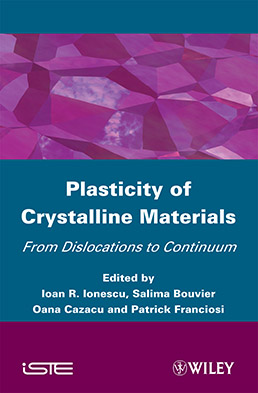
This book details recent advances in all aspects related to scale transition in crystal plasticity and damage, with a particular focus on the challenges associated with the characterization and modeling of this class of complex interactions.
The following topics are included:
- Innovative characterization techniques (multi-scale characterization, SEMTEM coupling, TEM-micro-diffraction coupling, in-situ mechanical tests, localization, image correlation, displacement field measurements, tomography, etc.).
- Computational crystal plasticity and damage (dislocation dynamics and ab initio calculations, microstructure evolution of polycrystals, comparison between FE, fast Fourier transform and self-consistent approaches, intragranular slip, heterogeneities, discrete approaches, etc.).
The book gathers together selected papers from the invited lectures presented at the 3rd and 4th US-France Symposia organized by the editors under the auspices of the International Center for Applied Computational Mechanics (ICACM).
Part One: Plasticity from the Discrete Dislocation Scale
1. Transition Methods in the Multiscale Simulation Framework: From the Atomic to the ContinuumScale, Ghiath Monnet.
2. Multiscale Modeling of Indentation: From Atomic to Continuum, Marc Fivel, Hyung-Jun Chang and Marc Verdier.
3. Stress Distribution and Plasticity, Christophe Déprés, Ciprian Manole, Pascale Balland, Fabien Degré, Virginie Pouzols and Laurent Tabourot.
Part Two: Substructure Influence
4. Mesoscale and Multiscale Modeling of Fracture, Alan Needleman.
5. Grain Size Effects in Generalized Continuum Crystal Plasticity, Nicolas M. Cordero, Samuel Forest, Esteban P. Busso, Stéphane Berbenni and Mohammed Cherkaoui.
6. Miniaturization Induced Size Effects, Clément Keller, Anne Marie Habraken, Eric Hug.
7. On Modeling the Combined Effects of Anisotropy and Tension-Compression Asymmetry of the Matrix on the Response of the Porous Aggregate, Joel B. Stewart and Oana Cazacu.
Part Three: Dynamic and Rate Effects
8. Eulerian Modeling of Dynamic Crystal Plasticity, Ioan R. Ionescu and Oana Cazacu.
9. Wavelet Transformation Induced Multi-Time Scaling Crystal Plasticity FEM for Cyclic Deformation in Polycrystalline Materials, Somnath Ghosh and Pritam Chakraborty.
10. Invariant of Thermally Activated Plastic Flow and Relationship with the Strain Rate Sensitivity, Catalin R. Picu.
11. Three Dimensional Compressible Multi-material Flow Computations Using a Parallelized Levelset-based Solver, Anil Kapahi, John Mousel, Shiv Sambasivan and H.S. Udaykumar.
12. Numerical Modeling of Experimentally-Observed Anisotropy: A Multiscale Approach, Alisar Tuncer, Stephen Kuchnicki and Alberto M. Cuitiño.
Ioan R. Ionescu is Professor at the University of Paris 13, in the Department of Engineering Sciences. His area of expertise is computational solid mechanics and solid Earth geophysics.
Salima Bouvier is Professor in the Department of Mechanical Engineering at the University of Technology of Compiègne in France. Her research fields include scale transition in metallic materials from an experimental point of view to constitutive modeling.
Oana Cazacu is currently Professor in the Department of Mechanical and Aerospace Engineering (REEF) in Shalimar , Florida, USA. Her main research interests lie in theoretical and computational solid mechanics with a focus on multi-scale modeling of plasticity and damage in textured metals.
Patrick Franciosi is the director of the CNRS laboratory of mechanical and thermodynamic properties of materials (LPMTM) at the University of Paris 13. His main acknowledged field of excellence is crystalline plasticity and related mechanical outcomes.